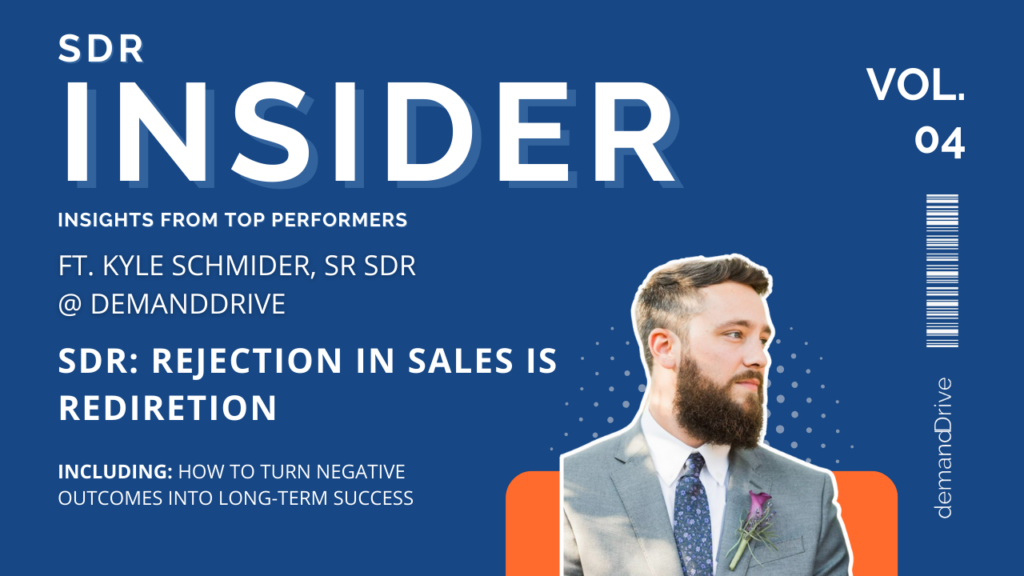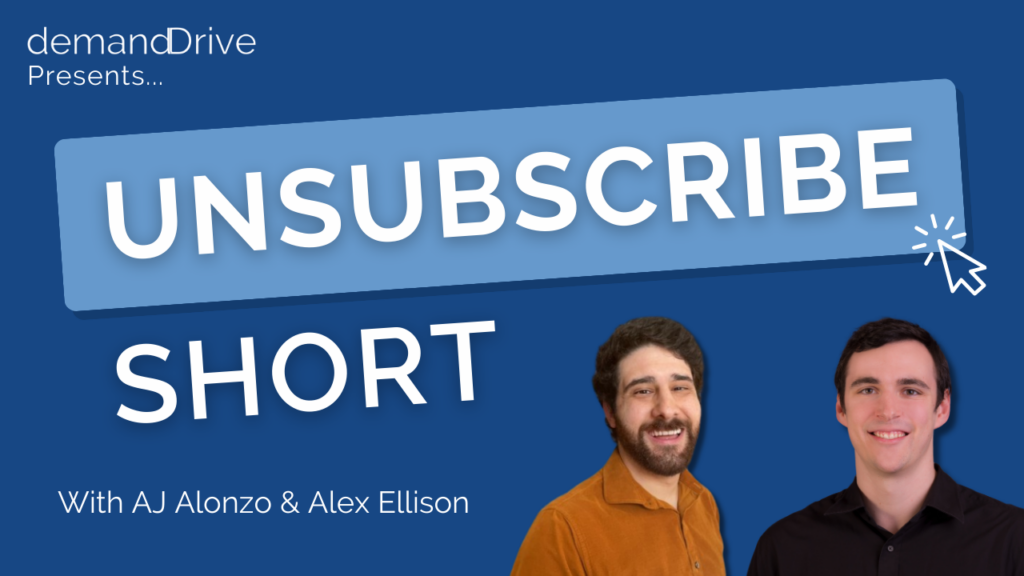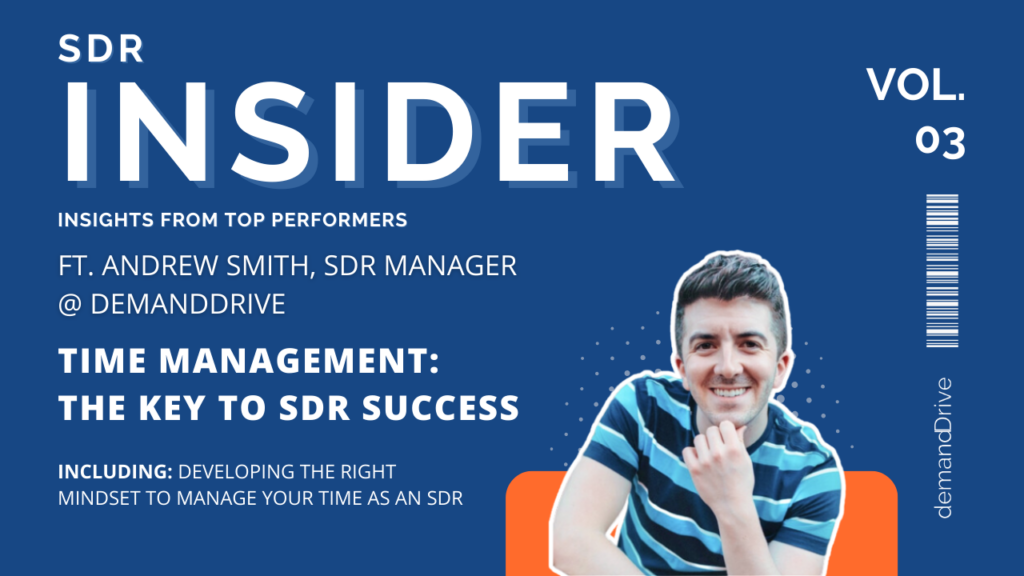Be The Why
You’re listening to UNSUBSCRIBE! This week we talk with Steve D’alessandro, one of the Directors of Client Engagement here at demandDrive, about the motivation tactics he uses with the SDRs on his team.
Find out what Steve does to get the most out of his reps and how you can trial those tactics at your own organization!
Side note: Please excuse the weird audio quality in this episode! We managed to fix it for future podcasts.
This week, we’re talking motivation tactics. How can you get the most out of your SDRs?
“You can’t throw out a contest at everyone and anyone and expect that to resonate/deliver the metrics or results you want.”
Key Takeaways
🌟 It’s important for a manager to understand that each individual SDR/rep is different, and you need to coach and manage them all in unique ways. Adapt to them, don’t have them adapt to you.
💪 If you know an SDR is struggling with email (for example), and that it’s not one of their main strengths, you have to try and manage or correct that. But you also have to understand that they might be a stronger employee if you focus on their strengths and work to build those up.
🎯 You can’t just throw out a contest at everyone and anyone and expect it to resonate or deliver the metrics/results you want. That’s lazy management.
Meet our team ➡️ https://bit.ly/dD-Team
Follow us on LinkedIn ➡️ https://bit.ly/dD-LI
Want to work with us? ➡️ https://bit.ly/Contact-dD
Want to work for us? ➡️ https://bit.ly/dD-Careers
A.J. Alonzo Hey, welcome to UNSUBSCRIBE. This is one of our episodes leading up to an interview with Brian prattle over at ambition. I am your host, Aj Alonzo, Director of Marketing here at demand drive. And I have with me, Alex Ellison, as always. (how’s it going?) And Alex, tell us a little bit about what this episode is going to be about.
Alex Ellison So just a little preview on what we talked with Brian about. He’s a co founder of ambition, which is a platform that really works to help motivate and sort of push reps in SDRs to do their best and we talked about talked to him about you know, his goal and he said is one of his goals for the company was to sort of be the why you know, the motivation that gets SDRs to do the best work they can possibly do. So we sort of wanted to dive into that a little bit here, not necessarily how ambition can be the why, but more about finding the why. From a manager standpoint, sort of figuring out what it is that that motivates SDRs to do the best work, right.
A.J. Alonzo And with us as a guest, we have Steve. He’s one of the directors of client engagement here at demand drive, manages a handful of reps, internally here. So Steve, go ahead and introduce yourself real quick.
Steve Hey, everybody, my name is Steve, the director of client engagement here at demand drive. I’ve been with the company a little over three years. My background is both in management and sales development. graduated from the University of Massachusetts in 2010. It’s very, very proud of as most people know, here, but happy to be on the show today.
A.J. Alonzo Awesome. So we’re talking about the the the lie so understanding that SDRs don’t just come in every day They get a paycheck, but they have sort of an underlying reason as to why they do what they do. And because you have a really hands on management style here, and you do manage a good chunk of the reps internally, we wanted to bring you on and talk a little bit about what you do to sort of get the most out of the SDRs if you manage and, you know, enlighten the audience a bit as to how they might be able to do the same at their companies.
Steve Yeah, absolutely. I think any manager will know that when they get introduced to a new SDR whether they brought them on in higher than themselves or they were introduced to the rep from someone else who was in charge of recruiting, you’ll typically hear the same story they’re they’re getting into the SDR role to to make some money to test their hand out in sales or to launch their sales career. When I was in college. One of the things that kept resonating in my mind is that every executive, moreover, not every executive but a lot of executives started their career in sales. So in terms of my ambition, No pun intended, I wanted to be an executive at some point in my life and work my way up the corporate ladder as they say, but now that I’ve been in management for 10 years or so, I’ve realized that it’s not just about you know, starting in sales and launching a career or coming in and making some money. There’s, there’s something more than that. I think it’s important for a manager to really understand that and to see each individual SDR, each individual rep as someone different and someone who is going to need different different ways to coach them and you have to adapt to them. So right, I would hone in on on someone’s strengths. But you got to be able to manage their weaknesses as well. So if you know an SDR is struggling with, you know, call it emailing and it is that’s not one of their, their, their main strengths. That’s something that you that you need to manage and you may not be able to ever fully corrected. But being able to understand that they’re going to be a stronger employee, while they’re on the phones, as opposed to the email part of their tactics is definitely crucial,
A.J. Alonzo Right. And I think you brought up a really good point is not only do you managed his weaknesses, like you said, but you’ve also played to their strengths. So a lot of reps. And we talk about this all the time internally here, and I know it’s really sort of catching on now. But a lot of organizations hold contests specifically geared towards like the strengths of specific reps. So if you’re really good on the phone, for example, but you know, like you said, email isn’t your strongest suit, run a contest, specifically around live phone connections? Because that’s going to motivate them to do the right work because they know, hey, like, this is what I’m good at. I can focus on this for a certain period of time, try to win a contest, get some kind of recognition and then sort of manage the email stuff later.
Steve Right. And you bring up a good point with contests. You know, We’ve always run different contests or I’ve always run different contests through whether it’s, you know, a team contest or an individual contest. But to your point, you really need to think about you can’t just throw out a contest at everyone and anyone and expect them that that resonate and reflect that to deliver the metrics or deliver the results you want. So, you know, Team Concert was good, because then you have the that, that the camaraderie camaraderie and, and the SDR, the rep will feel more compelled to not let their team down. accountability. There’s Yeah, exactly. But some, some reps, you know, you find you find it as a carrot that motivates me dangle that in front, and then you can run an individual contest to get them to deliver the results that you’re looking for.
Alex Ellison yeah, contests are obviously like a great way to get reps motivated to find, you know, at least maybe for specific individuals, any like, challenges if somebody maybe doesn’t get motivated for contests are, you know, the typical things that you do to try to motivate people motivated to get their job done to find challenges sometimes finding that that carrot?
Steve it definitely is. And, you know, you’re going to find the the car that typically you work the best with are the ones that are motivated by the same things that you’re motivated by. But it’s always, you know, a good manager will understand that some, some people are going to have different motivational factors outside of, you know, money, job growth, even even, you know, we talked about millennials a lot here and millennials. A lot of times we’ll say they want to have an impact on the organization and an impact on the bottom line, but I try to read between the lines and understand, you know, what does that as your want to do to contribute what what do they want to do to have that impact and is that the ultimate kind of end goal for them? You know, we’ve seen SDRs be wildly successful, mainly because and mainly mainly due to the fact that they’re motivated by recognition for their peers or recognition from management. You know, they don’t, we don’t have to pay them anymore. We don’t have to promote them. But just getting that group recognition, whether it’s from a manager or from their peers can definitely move the needle as well.
A.J. Alonzo Yeah. And do you find that these SDR sort of not necessarily bucket themselves into a specific pathway? But like, like you said, If you find that somebody is wide, essentially, it’s like group recognition and really letting people know that they’re good at their job. Do you find that they’re more geared towards like an account executive and closing role tracks? Or do you see them maybe try their hands and other things? Like you said, Millennials like to have impact on the bottom line? put their hands in a lot of different buckets. So do they try out marketing, for example, or is it like strictly, I love recognition. I want to be in sales. Let’s go and move forward with this.
Steve Yeah, absolutely. I would say there’s no hard and fast rule, but in my experience, I’ve seen the people that are voting Have a divided group recognition and working with others. And in those group contests, like we talked about, those are the people I typically see trend toward management, you know, owning a function or working with others and being able to develop and motivate someone else besides just themselves. And the other side of the coin, and no less is the account executive role where maybe they’re not managing anyone, and they don’t care so much about the group recognition, but they see a way to make their financial means net.
A.J. Alonzo See, well, very insightful stuff in terms of sort of managing your, your internal SDRs. What sort of motivates people individually, how to get the most out of them. And really make sure that you know, you have a high functioning sales development team, looking at them as sort of a team but as individuals to make sure that you’re getting the most out of each one so that the sum of the parts is sort of greater as a whole
Steve Exactly.
A.J. Alonzo Well, thanks so much for your time. I really appreciate it. You have any last sort of parting words for the audience before we cut you off?
Steve No, I mean, I think just the the overall Master’s in employee engagement is crucial. You know, you can look at different ways of measuring organization success but being able to have employees that want to work well for you. They want to work well for the company, and they want to work well for themselves. Is is impactful and can make or break an organization.
A.J. Alonzo Wise words. Thanks again for coming on. I really appreciate it.
Steve Thanks for having me guys.
Other Episodes
Ep. 4 • 31 min.
Ep. 2 • 11 min.
Ep. 3 • 48 min.




